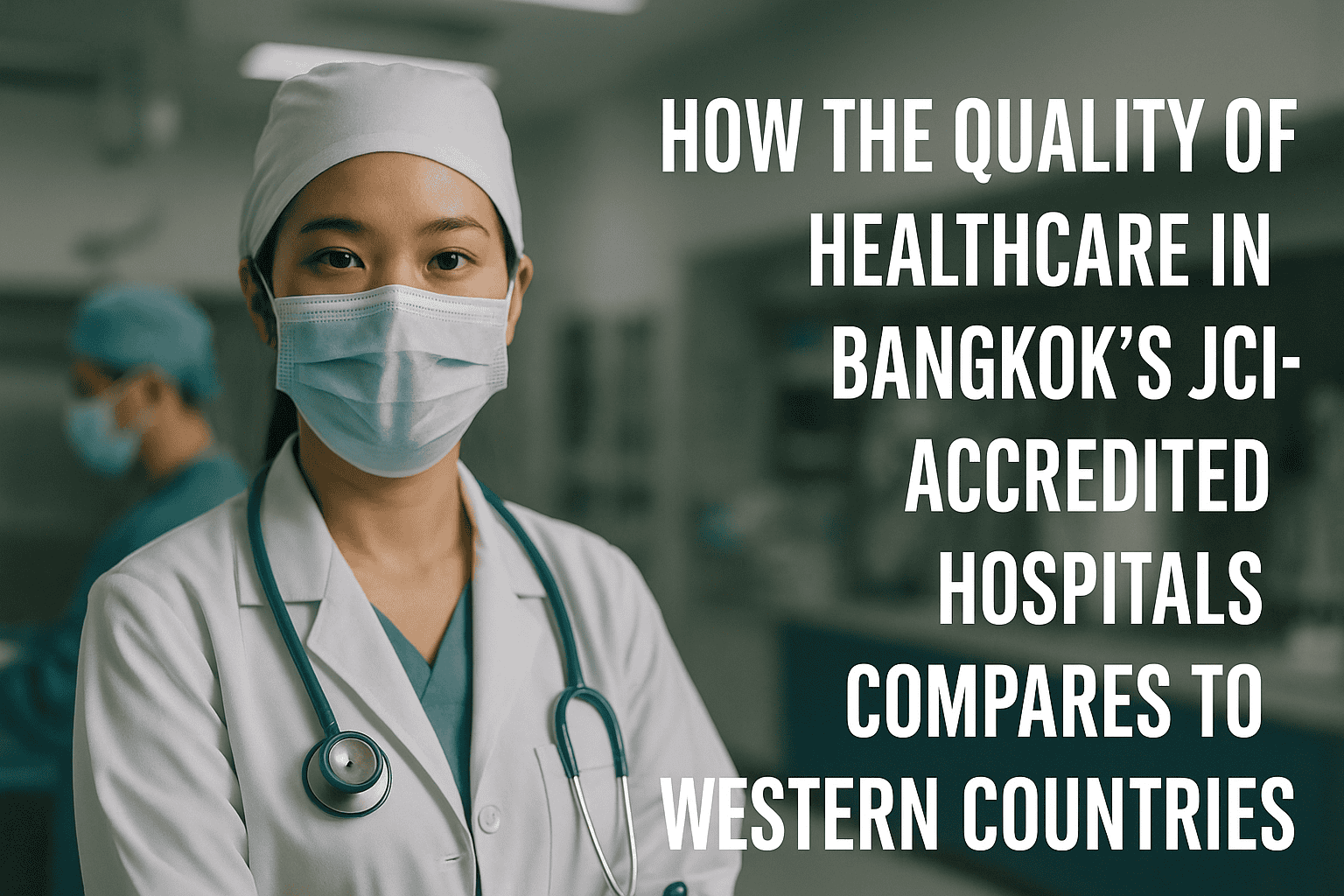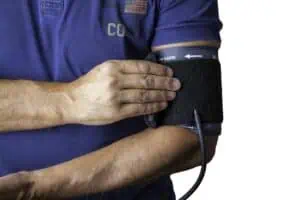How the Quality of Healthcare in Bangkok’s JCI-Accredited Hospitals Compares to Western Countries
Introduction
For many travelers from the United States and Europe, Bangkok has become synonymous with world-class medical care. The city is home to a large number of JCI-accredited hospitals, often praised for combining Western-standard healthcare quality with lower treatment costs and exceptional hospitality.
But how does the quality of healthcare in Bangkok’s JCI hospitals truly compare with that of hospitals in the U.S., U.K., or other Western countries? This comprehensive article explores that question using recognized standards, cost comparisons, and global healthcare benchmarks.
What Is JCI Accreditation?
The Joint Commission International (JCI) is a U.S.-based organization that accredits healthcare institutions worldwide based on rigorous criteria for patient safety, infection control, and clinical governance.
JCI accreditation means a hospital has met globally recognized standards equivalent to those followed by top hospitals in the United States. Accredited facilities are audited every three years to ensure continuous compliance.
Key JCI Standards Include
- Patient safety and rights
- Evidence-based medical protocols
- Leadership and governance
- Infection prevention and control
- Quality improvement systems
Hospitals that achieve JCI accreditation demonstrate that they operate at the same fundamental standard as top Western hospitals — from how medications are prescribed to how surgical procedures are verified.
Bangkok’s JCI-Accredited Hospitals
Bangkok ranks among the top global destinations for international healthcare. Across Thailand, more than sixty hospitals hold JCI accreditation — the fourth-highest number in the world (Healthcare in Thailand).
Leading JCI-Accredited Hospitals in Bangkok Include
- Bumrungrad International Hospital — One of Asia’s largest private hospitals and the first in Asia to earn JCI accreditation in 2002 (Bumrungrad International Hospital).
- Bangkok Hospital — A flagship private hospital network facility offering advanced centers for surgery, oncology, and cardiac care (Bangkok Hospital).
- Samitivej Hospital — A well-known private hospital group (see Healthcare in Thailand).
- Yanhee International Hospital — A cosmetic Bangkok hospital with strong international patient services (see Healthcare in Thailand).
These hospitals often employ physicians trained in Western countries and maintain partnerships with institutions in the U.S., U.K., and elsewhere.
Healthcare Quality Standards: Bangkok vs Western Countries
1) Medical Expertise and Training
Many doctors in Bangkok’s private hospitals have been trained, certified, or completed fellowships in the U.S., U.K., or Australia. This supports treatment protocols and bedside communication that closely match Western standards. In JCI hospitals, English is the primary working language for international departments, simplifying communication for American and European patients.
2) Patient Safety and Clinical Procedures
JCI standards require safety measures used in Western hospitals, including WHO-based surgical checklists, patient identification before any medication or procedure, 24/7 emergency response systems, and robust infection prevention monitoring. These are congruent with systems in hospitals accredited by The Joint Commission in the United States.
3) Technology and Infrastructure
Bangkok’s JCI-accredited hospitals invest heavily in modern infrastructure: robotic-assisted surgery, advanced MRI/CT, hybrid operating theatres, and integrated digital medical records. Facilities such as Bangkok International Hospital are known for highly integrated electronic health record systems and teleconsultation support, comparable to leading U.S. institutions.
4) Patient Satisfaction and Service Culture
One distinctive advantage in Thailand is the hospitality element. The cultural emphasis on attentiveness and service translates into high patient satisfaction, comfortable private rooms, and coordinated international patient services — areas where Western systems may face constraints due to insurance complexity and operational pressures.
Cost and Accessibility Comparison
1) Cost of Treatment
The United States has among the highest healthcare costs globally (Health care in the United States). A procedure that might cost tens of thousands of dollars in the U.S. can often be performed at substantially lower cost in a JCI-accredited Bangkok hospital while maintaining high quality standards.
2) Insurance and Payment
While most Western hospitals depend on domestic insurance networks, Bangkok’s international hospitals routinely handle self-pay and international insurance. Itemized or package pricing can include consultation, diagnostics, surgery, medications, and hospital stay — adding clarity and predictability for medical travelers.
3) Waiting Times
Public systems in Western countries can involve long waiting times for elective procedures. In Bangkok’s private sector, patients typically schedule consultations and surgeries within days or weeks, not months.
Patient Safety and Outcomes
A core question for Western patients is whether outcomes in Bangkok match those at home. Evidence cited by international bodies indicates that JCI-compliant systems produce safety and quality outcomes comparable to Western hospitals with similar case mixes. While Western hospitals may publish more granular public outcomes, Bangkok’s JCI hospitals follow similarly rigorous internal monitoring.
Infrastructure and Facilities
- Hotel-like private rooms, concierge services, and personalized nursing.
- Advanced technology, including robotic surgery and minimally invasive imaging.
- Affiliations and exchanges with Western systems (see Healthcare in Thailand).
For instance, Bumrungrad International Hospital has long been associated with comprehensive digital integration and international patient flows, supporting safety and efficiency at scale.
The Medical Tourism Advantage
Thailand is among the world’s most popular medical tourism destinations (Medical tourism in Thailand). Bangkok’s JCI hospitals attract hundreds of thousands of international patients annually, including many from the United States, Canada, and Australia.
- Western-trained doctors and nurses
- Transparent package pricing
- English-speaking care teams
- World-class hospitality and recovery environments
- Integration of medical care with wellness and travel
Comparison Table: Bangkok JCI Hospitals vs Western Hospitals
| Category | Bangkok JCI Hospitals | Western Hospitals (USA/Europe) |
|---|---|---|
| Accreditation | JCI international standards | National or JCI (U.S.) |
| Doctor Training | Often Western-trained | Western-trained |
| Patient Safety | WHO & JCI standards | WHO & The Joint Commission standards |
| Technology | State-of-the-art equipment | State-of-the-art equipment |
| Cost | Substantially lower for many procedures | Significantly higher |
| Wait Time | Short (days–weeks) | Often longer (weeks–months) |
| Hospitality | 5-star service orientation | Functional but variable |
| Language | English and multilingual support | Primarily native language |
| Accessibility | Open to self-pay and international insurance | Primarily domestic insurance pathways |
Challenges and Considerations
- Follow-up care: Post-surgical rehabilitation or complications may require coordination with local doctors at home.
- Travel distance: Long-haul flights can be challenging after major surgery.
- Insurance limitations: Some U.S. policies do not reimburse overseas treatment (U.S. healthcare overview).
- Data transparency: Western hospitals often publish detailed outcomes; Asian private hospitals may share granular data on request rather than publicly.
Despite these points, satisfaction among medical tourists suggests that for many elective or planned procedures, the Bangkok option is both safe and cost-effective.
Why U.S. Patients Choose Bangkok
- Comparable Quality at Lower Cost — JCI accreditation aligns with U.S. standards (JCI).
- Shorter Waiting Times — Faster access for consultation and surgery than many public systems.
- Excellent Hospitality and Service — Strong service culture and private rooms.
- Integrated Medical-Wellness Experience — Combine treatment with recovery travel across Thailand (Medical tourism in Thailand).
- Proven International Track Record — Major Bangkok hospitals manage high volumes of international patients (Bumrungrad; Bangkok Hospital).
Conclusion
Bangkok’s JCI-accredited hospitals have helped make Thailand a global center for high-quality medical care, offering standards equivalent to Western institutions but with superior affordability and hospitality. For American patients seeking safe, effective, and efficient treatment abroad, these hospitals deliver Western-standard outcomes at a fraction of U.S. costs — without compromising safety or comfort. With careful planning, verified accreditation, and reliable coordination for follow-up care, medical travelers can experience the best of both worlds: world-class healthcare and the warmth of Thai service.
FAQs
What is JCI accreditation and why does it matter for U.S. patients?
Joint Commission International (JCI) accredits hospitals worldwide against rigorous safety and quality standards aligned with those used by The Joint Commission in the United States. For American patients, JCI indicates that a Bangkok hospital follows internationally recognized practices in patient safety, infection control, clinical governance, and continuous improvement.
Are Bangkok’s JCI-accredited hospitals comparable to Western hospitals in quality?
Yes. JCI accreditation requires hospitals to implement safety and quality systems comparable to Western standards (WHO-based surgical checklists, medication safety, infection prevention). Bangkok’s leading private hospitals also employ many Western-trained physicians and use modern technology. See The Joint Commission and Healthcare in Thailand.
Is treatment in Bangkok more affordable than in the United States?
Typically yes. Many elective and planned procedures cost significantly less in Bangkok than in the United States, while being delivered in JCI-accredited facilities. Package pricing often includes consultations, diagnostics, surgery, medications, and hospital stay. For U.S. context, see Health care in the United States.
Which well-known JCI-accredited hospitals are in Bangkok?
Examples include Bumrungrad International Hospital and Bangkok Hospital, among others. These providers treat large numbers of international patients and operate JCI-compliant systems.
What should U.S. patients consider before traveling for surgery in Bangkok?
Confirm current JCI accreditation, review surgeon credentials and experience, request itemized package pricing, plan post-operative follow-up with a local U.S. physician, and consider travel timing and recovery needs. See JCI and Medical tourism in Thailand.




